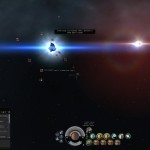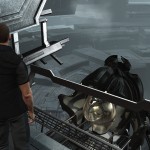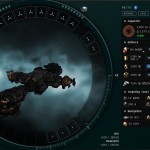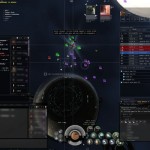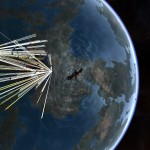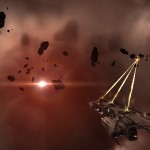This post is a reply to the Blog Banter #42.
The 2012 Community Review of EVE Online
“A gaming universe as vast and unique as EVE Online is constantly evolving and the experience is different for every participant. Conventional games review techniques cannot possibly hope to provide an accurate measure of every aspect of EVE’s gameplay. However, with a community initiative like the Blog Banters, we have the resources to deliver the most thorough and up-to-date review ever.
By combining the experiences of contributors from across the EVE metasphere, we get a wealth of opinions from veterans and rookies alike. We’ll be able to combine input from faction warfare specialists, wormhole residents, null-sec warriors, missioners, pirates, industrialists, roleplayers, politicians and more to paint a complete picture of the health and progress of EVE Online in its current Retribution incarnation.
Who better to review EVE Online, than those who know it best?”
Last year The Blogging Community of EVE Online attempted a crowdsourced review of EVE Online. I have taken part as well, and you can read my contribution here. This year we will be changing the way the Community Review is done, by focusing on a single area of the game.
As a member of Aideron Technologies I can do no different, but focus on item crafting, which in EVE is better known as industry.
This review is up-to-date for Retribution expansion.
Item Crafting in EVE Online
Science and Industry in EVE Online is just as important as its famous, unforgiving PVP. While many players call industrialists carebears and consider them inferior type of players, industry and pvp are like yin and yang: one cannot exist without the other and they are not mutually exclusive: combat results in ship destruction, so it’s creating a demand – demand for ships, modules, drones and munitions. Nearly all items (with the exception of blueprints, meta 1-4 items, officer & deadspace drops and implants) are manufactured by players. An open, player-driven market completes the picture, allowing manufacturers to sell their goods to combatants (or just re-sell them for profit).
Different classes of items require different materials and the manufacturing cycle is different. Many items require multi-staged production, so crafting in EVE is far from simple and requires considerable amount of planning. On the other hand, completing big endavours like building a supercapital ship or manufacturing and anchoring a player-owned Outpost in null space rewards a lot of satisfaction.
Item classes and material groups
Items in EVE are divided into several groups, which require different approach to craft and different types of materials.
To manufacture an item, one needs its blueprint and appropriate materials. Obtaining blueprints may be as easy as buying them from NPC, but some advanced blueprints have to be invented or reverse engineered.
- Tech I is the simplest one, because one only needs an appropriate Blueprint (sold by NPCs) and the right amount of Minerals. Minerals can be obtained from a gathering profession (Mining).
- Tech II is a more advanced one. Blueprints have to be Invented first, some materials are obtained by Moon Mining and have to be transformed at a player-owned-starbase. One has to build components from these materials. In the last stage, components, minerals, Planetary Interaction products and the base Tech I item are combined to create a Tech II item.
- Capital Construction is very similar to Tech I in terms of materials, but has two stages: an enteprising player needs to build capital parts first, and then combine them together to make the ship itself. Both parts and ships blueprints are rather expensive, so the barrier of entry is rather high.
- Tech III is similar to Tech II, but the differences are in details. Activity to obtain the Tech III blueprint is known as Reverse Engineering, and materials are harvested from specific NPCs (sleepers) and specific regions of game (wormhole space).
- Planetary Interaction has been added as part of the Tyrannis expansion and allows players to extract and produce materials on planets. These materials are later used for making in-space structures, commonly called player owned starbases (prior to this expansion POSs have been sold by the NPCs).
- Rig manufacturing – allows players to use materials obtained from ship wrecks to make useful jury rigs for ships.
- Outpost Construction is similar to Capital Construction, but uses both minerals and materials obtained from Planetary Interaction.
Of course as every other activity in EVE, one needs to have an appropriate skillset to make an efficient manufacturer. Four groups of skills are used for manufacturing:
- Industry
- Mechanics
- Planet Management
- Science
Crafting system design score: 90/100. Crafting in EVE Online is great, but at times seems a bit overcomplicated, especially when looking at Tech II and III production chains, which are quite long and require several stages. On the other hand, finishing a complicated task like this can be considered an accomplishment, and will be a source of satisfaction for the player.
Science and Industry user interface
Unfortunately S&I GUI have not changed much over the years. CCP has added new activities over the years, but the interface is built with a very small scale industry in mind. Large scale operations in corporations like Aideron Technologies is basically a clickfest, because one need to set the activity and production line for each job separately. Each job requires at least 8 mouse clicks and entering some numbers from keyboard. Setting up 10 manufacturing jobs twice a day and 10 invention jobs four times a day will not prolong the life of your computer’s mouse. It also makes setting up jobs hard on laptops with a touchpad only. Setting up Planetary Interaction and production chains at player-owned-starbase also takes a lot of clicking, but this fortunately has to be done only once. Maintenance of planetary colonies has already been streamlined by the CCP, so the amount of mouse clicks in PI has been substantially reduced.
Science and Industry GUI requires a serious rework to reduce the amount of clicks substantially. Optimizations, which would improve player experience include:
- Grouping jobs – ability to start several identical jobs with just one set of clicks, instead of setting each job separately.
- Material quota screen should be optional if all materials are available and should only show if anything is missing.
- Linking structures in POS should be done in a graphical manner, similar to Planetary Interaction. Both interfaces should be made very similar, so players only have to learn once.
- Planning screen should be added to avoid the use of third party apps and trackers. Such screen would allow player to plan the production of any item, getting a material quota (even for sub-components). A saved plan could be tracked (daily, weekly or monthly), to let the CEO know how much work has already been done.
- Invention and Reverse Engineering are currently chance based. Random chance is quite easy to include in plans, but has two serious downsides:
- unsuccessful jobs result in some tedious clicking to be completely fruitless,
- it requires corporations to keep an extra stock (of blueprint copies, datacores and sometimes decryptors), Deterministic approach would allow more precise resource planning
- Possible solution: making invention jobs 60% longer, require higher skills and 60% more datacores, but they would always succeed.
Crafting system implementation score: 65/100. Industry in EVE is a clickfest and requires considerable amount of out-of-game tools for larger operations. There is plenty of room for improvement in that regard.
Wrapping up
Total score: 77,5/100. Industry in EVE is rather complicated but also a very rewarding profession. It fuels the war machine of EVE and the player-driven economy would have failed without it. Unfortunately the UI is old and needs a serious rework. It should also be possible to conduct larger operations without the need to use Excel and third party tools, which are currently essential.
Other contributions:
- The Five Year Re-Review by Jacabon Mere @ Capital Storm Corporation
- Harkconnan’s Eve Online Review by Harkconnan @ Extra Vehicular
- An EVE Year in Review by Evehermit
- Multiplayer by Corelin @ Mad Haberdashers
- 2012 Community Review of EVE Online by Drackarn @ Sand, Cider and Spaceships
- OOC Soylent Green review of Eve by Mike Azariah @ A Missioneer in Eve
- EVE Online 2012 Review by Roc Wieler @ Roc’s Ramblings
- 2012: The Rebirth of Faction War by Kuan Yida @ Random Posts from Auga
- The Capsuleer Experience by Kody Gloval @ Electronics Evangelist
- It was a Rebuilding Year by Mabrick @ Mabrick’s Mumblings
- Is EvE the answer? by Helena Khan @ Aggressive Logistics
- My Year in Review by Sugar Kyle @ Low Sec Lifestyle
- Eve is 1000% Better Now by Rixx Javix @ Eveoganda
- Trying to Review EVE Online, Are you Kidding Me? by Ardent Defender
- The Road More Traveled by Aiden Mourn @ Finders & Keepers
- EVE in Review – Exploration by Morphisat @ Morphisat’s Blog
- Reviewing Eve, again by Urziel99 @ Urziel’s EVE Chronicle
- 2012 Eve Online Review, Harri Style by Harrigan Vonstudly @ Gun Turret Diplomacy
- Eve Online Review – Retribution.. or Deliverance by Orakkus @ 2nd Anomaly From the Left


